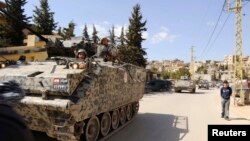Lebanese security forces say a tip from U.S. intelligence agencies enabled them to pre-empt an assault planned by Syrian jihadists on predominantly Shi’ite Muslim villages in the Bekaa Valley. The intelligence disclosure is part of a mounting Western effort to help Lebanon’s army curb violent sectarian spillover from Syria’s civil war, analysts say.
The plan called for raiding Lebanese villages and kidnapping locals as bargaining chips to free Islamist prisoners from Lebanese jails, according to Lebanese security officials.
Such an attack would risk stoking sectarian flames in Lebanon, which analysts say groups such as al-Qaida affiliate Jabhat al-Nusra and the Islamic State of Iraq and the Levant are keen to do.
Both jihadist groups have been behind a string of suicide bombings in Lebanon. And both have warned of more attacks in Lebanon to retaliate for its military’s support of Hezbollah, the militant Shi’ite movement backing Syria’s President Bashar al-Assad.
In April, Syrian forces joined Hezbollah fighters in launching what they said would be a final offensive in the Qalamoun region, stretching from the Syrian capital of Damascus west to Lebanon’s border. Syrian government forces have retaken much of the rugged, sparsely populated region but appear unable to break down major pockets of fierce rebel resistance.
In recent days, violent clashes between Syrian forces and rebels have spilled from Syria west into Lebanon’s Bekaa Valley, with much of the fighting in Qalamoun. Last week, for instance, Hezbollah fighters and Syrian insurgents clashed in the valley. On Wednesday, Lebanese security forces searched the surrounding mountains for Sunni militant infiltrators from Syria.
An estimated 3,000 Syrian insurgents have been using remote Lebanese border regions as a base for attacks on Syrian government forces and Hezbollah forces in Lebanon.
Some Sunni Muslim politicians blame Hezbollah for the Syria-related violence episodically striking Lebanon.
“When Hezbollah entered Syria, they brought upon themselves a big problem and dragged the country to battles which we did not need,” said Issam Araji, a Sunni Lebanese lawmaker.
Lebanon shifts elite military units
To combat the rising jihadist threats, Lebanon recently redeployed crack military units, including its 8th Mechanized Infantry Brigade and airborne assault teams. The elite units traditionally focus on curtailing volatility along Lebanon’s southern border with Israel.
The operational shift led to the intelligence coup of heading off the assault, said Aram Nerguizian, a military analyst with the Center for Strategic and International Studies, a Washington-based think tank.
Lebanon’s military has made other moves to avoid being dragged into the maelstrom of Syria’s civil war. For the past year, with help from the United States and United Kingdom, it has built up roughly a dozen watchtowers and other fortifications stretching roughly 170 kilometers, or 106 miles, along the rugged, traditionally lawless border.
The observation posts, close enough to offer overlapping views, are equipped with surveillance systems and other defenses against threats such as rocket-propelled grenades, Nerguizian said. The Lebanese Armed Forces have “worked hard to rapidly bring online its border forces to manage growing instability from Syria.”
He said its efforts aren’t “so much about policing the border but denying space in Lebanon” from which Syrian rebels can launch operations against Assad.
While the watchtowers are in mainly unpopulated areas only used by refugees fleeing Syria, smugglers and rebels, the LAF’s increased presence in recent weeks in the villages and towns of the Bekaa Valley prompted mixed feelings.
Local Shi’ite Muslims and Christians welcome the army, according to Archbishop Elias Rahal of the Melkite Greek Catholic Church. “The army’s operation is echoing positively.”
Local Sunni Muslims and their politicians, though, are critical, especially in Arsal, a hardscrabble Sunni town that has seen its population more than doubled, swollen by at least 40,000 Syrian refugees as well as Syrian rebel fighters.
The town’s inhabitants are highly supportive of the Syrian rebels and have long accused Hezbollah fighters of treating them with condescension.
And they argue the army is in collusion with the militant Shi’ite movement, taking action against Sunni militants but not against Hezbollah fighters.
Abed Hassan, a 24-year-old marble quarryman, told VOA that Sunnis are avoiding the neighboring Shi’ite town of Hermel for fear of violence.
“Hezbollah fighters have been mounting informal checkpoints and young Sunnis risk being seized when we travel beyond Arsal,” he said.
Earlier this month, Hezbollah mounted a military show of force in Bekaa Valley towns near Arsal with parades of military hardware and fighters. That earned the rebuke of Sunni lawmakers, including Ahmad Fatfat.
“We were surprised to hear about this military parade by Hezbollah. This area is under the supervision of the Lebanese Army, and we were surprised that there was no reaction from security forces to what we saw,” Fatfat complained at a news conference.




